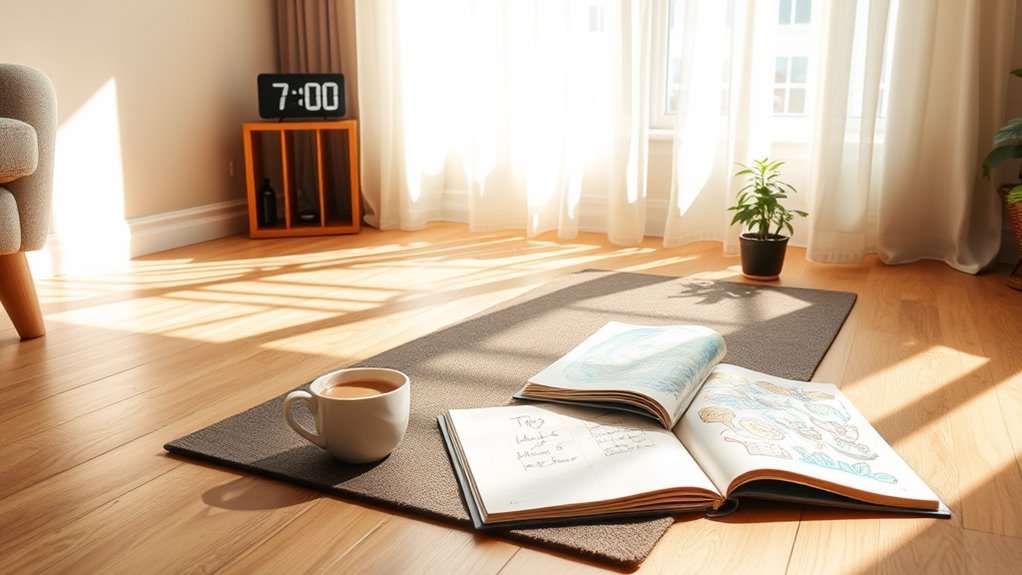The One Thing You Can Do Tonight to Sleep Like a Baby
To sleep like a baby tonight, establish a calming bedtime routine. Start winding down at least 30 minutes before sleep by dimming lights and avoiding screens. Engage in relaxation techniques like deep breathing or gentle stretching. Create a comfortable sleep environment with cool temperatures and soothing scents, like lavender. Limit heavy meals and caffeine before bed to enhance your rest. Discover more tips to refine your bedtime ritual and guarantee rejuvenating sleep.
Key Takeaways
- Create a calming pre-sleep routine by dimming lights, practicing relaxation techniques, and eliminating distractions to prepare your mind and body for sleep.
- Reduce screen time 30 to 60 minutes before bed to enhance melatonin production and improve sleep quality.
- Set a consistent bedtime and wake-up time to regulate your internal clock and promote refreshing sleep.
- Optimize your sleep environment by keeping the room cool, comfortable, and free from disruptive noises.
- Use calming scents like lavender or chamomile to enhance relaxation and improve overall sleep quality.
Understanding Sleep Cycles
Understanding sleep cycles is fundamental if you want to improve your sleep quality. Each night, your body goes through multiple cycles, including REM and non-REM stages, which play vital roles in restoring your energy and enhancing cognitive function.
By mastering the timing of these cycles, you can achieve better sleep. Aim for 7 to 9 hours per night to allow for complete cycles, typically lasting about 90 minutes each.
Tracking your sleep patterns can help you identify your ideal sleep duration and best bedtime. Recognizing when you’re naturally in lighter sleep can make waking up easier and more rejuvenating. Additionally, incorporating simple nighttime rituals can significantly enhance your sleep environment and promote relaxation.
Ultimately, by understanding and respecting your sleep cycles, you’ll reveal the secret to better sleep and wake up feeling revitalized.
The Importance of a Bedtime Routine
Creating a bedtime routine is essential for a good night’s sleep.
By establishing a consistent sleep schedule and incorporating relaxation techniques, you can signal your body that it’s time to wind down.
This simple practice can greatly improve your sleep quality. Additionally, incorporating a simple evening routine can further enhance your relaxation process and prepare your mind for rest.
Establish Consistent Sleep Schedule
When you establish a consistent sleep schedule, you’re setting the foundation for better rest and overall health. Consistency helps regulate your body’s internal clock, making it easier to fall asleep and wake up refreshed. Here’s a simple breakdown of the benefits and strategies:
| Benefit | Strategy | Outcome |
|---|---|---|
| Improved mood | Go to bed and wake up at the same time daily | Enhanced emotional stability |
| Better focus | Limit naps to 20 minutes | Increased daytime alertness |
| Enhanced metabolism | Avoid heavy meals before bed | Improved digestion |
| Strengthened immunity | Reduce screen time an hour prior | Better immune function |
| Lower stress levels | Create a calming pre-sleep routine | Greater relaxation |
Prioritizing sleep as a key aspect of self-care can lead to significant improvements in both physical and mental well-being.
Incorporate Relaxation Techniques
A calming bedtime routine can greatly enhance your sleep quality. By incorporating relaxation techniques, you signal your body that it’s time to wind down.
Start with deep breathing exercises; inhale slowly through your nose, hold for a few seconds, then exhale gently. Progress to gentle stretching or yoga to release tension. Consider using guided meditations or soothing music to create a tranquil atmosphere. Dim the lights and limit screen time to reduce overstimulation.
Journaling your thoughts can also clear your mind, making it easier to let go of the day’s stress. Additionally, practicing a soothing breathing exercise before bed can further promote relaxation and improve your sleep quality. Commit to this routine nightly, and you’ll cultivate a powerful habit that sets the stage for restorative sleep.
Master these techniques, and watch your sleep transform.
Creating a Calming Environment
To drift off into a peaceful slumber, you’ll want to guarantee your environment promotes relaxation.
Start by dimming the lights to create a soothing atmosphere; soft lighting signals your body that it’s time to wind down.
Choose comfortable bedding—invest in quality sheets and pillows that cradle you gently.
Consider the room’s temperature; a cool environment, ideally around 60-67°F, encourages restful sleep.
Incorporate calming scents like lavender or chamomile through essential oils or candles to enhance tranquility.
Finally, eliminate disruptive noise—utilize earplugs or a white noise machine if necessary.
By intentionally crafting your sleeping space, you’ll cultivate a sanctuary that invites serenity and fosters the deep rest you crave. Establishing a relaxing bedtime routine can significantly enhance your sleep quality and lead to better sleep tonight.
Prioritize these elements, and watch your sleep transform.
Limiting Screen Time Before Bed
If you want to sleep better, cutting down on screen time before bed is essential.
The blue light from your devices can disrupt your sleep cycle, making it harder to fall asleep.
Instead of scrolling through your phone, consider engaging in alternative evening activities that promote relaxation.
Effects of Blue Light
As the day winds down, the blue light emitted by screens can trick your brain into thinking it’s still daytime, making it harder for you to unwind and fall asleep.
This interference with your body’s natural circadian rhythm can lead to increased alertness and decreased melatonin production, the hormone responsible for regulating sleep.
When you’re exposed to blue light too close to bedtime, you may find it challenging to relax, leaving you tossing and turning instead of drifting off peacefully.
To master your sleep quality, consider reducing screen time in the evening.
Recommended Screen-Free Duration
While you might be tempted to scroll through your phone right before bed, experts recommend setting a screen-free duration of at least 30 to 60 minutes to improve your sleep quality. By disconnecting from screens, you allow your mind to unwind and prepare for restorative sleep.
| Duration | Benefits |
|---|---|
| 30 minutes | Reduces sleep latency |
| 45 minutes | Enhances melatonin production |
| 60 minutes | Promotes deeper sleep |
Implementing this simple practice can greatly enhance your nightly rest. Consider creating a calming pre-sleep ritual during this time, focusing on relaxation. Commit to this change tonight, and you’ll likely notice a marked improvement in your overall sleep experience.
Alternative Evening Activities
After embracing a screen-free duration before bed, you might wonder what to do with that newfound time.
Consider diving into a good book. Whether it’s fiction or non-fiction, reading can transport you to another world and calm your mind.
Alternatively, try journaling; reflecting on your day can provide clarity and help you unwind.
You could also practice gentle yoga or meditation, focusing on your breath to release tension.
If you enjoy creativity, sketching or knitting could be a soothing outlet.
Engage in a warm bath or prepare herbal tea to further signal to your body that it’s time to wind down.
Embrace these activities to enrich your evenings and enhance your sleep quality.
Incorporating Relaxation Techniques
To enhance your sleep quality, incorporating relaxation techniques into your bedtime routine can make a significant difference.
Start by practicing deep breathing exercises; inhale slowly through your nose, hold for a few seconds, and exhale through your mouth. This calms your mind and signals your body to unwind.
Next, consider progressive muscle relaxation, where you tense and then relax each muscle group from your toes to your head.
Visualization can also be powerful; imagine a serene landscape that brings you peace.
Finally, dedicate a few minutes to gentle stretching or yoga to release tension.
The Role of Nutrition in Sleep
A calm mind isn’t the only factor in achieving restful sleep; what you eat plays an important role, too. To optimize your sleep, focus on nutrient-rich foods. Incorporate magnesium-rich options like leafy greens and nuts, which help relax your muscles and nerves.
Avoid heavy meals and caffeine close to bedtime, as they can disrupt your sleep cycle. Instead, consider a light snack, such as a banana or a small bowl of oatmeal, which promotes the production of sleep-inducing serotonin.
Hydration is crucial, but don’t overdo it before bed; you want to minimize nighttime trips to the bathroom. By making intentional dietary choices, you can greatly enhance your ability to drift into a deep, restorative slumber.
Managing Stress and Anxiety
Managing stress and anxiety is essential for a good night’s sleep.
You can use breathing techniques to relax your mind and body, making it easier to unwind.
Additionally, journaling your thoughts can help clear your head, so you can rest without racing thoughts keeping you awake.
Breathing Techniques for Relaxation
While stress and anxiety can feel overwhelming, incorporating simple breathing techniques into your daily routine can create a sense of calm.
Mastering these techniques won’t only enhance your relaxation but also improve your overall well-being. Here are three effective methods to try:
-
Diaphragmatic Breathing: Inhale deeply through your nose, allowing your abdomen to expand. Exhale slowly through your mouth. Repeat for five minutes.
-
4-7-8 Technique: Inhale for four seconds, hold for seven seconds, and exhale for eight seconds. This pattern promotes relaxation.
-
Box Breathing: Inhale for four counts, hold for four, exhale for four, and pause for another four. This technique helps center your mind.
Practice these techniques regularly, and you’ll cultivate greater tranquility and resilience against stress.
Journaling to Release Thoughts
When you feel overwhelmed by thoughts and emotions, journaling can be a powerful tool for releasing those burdens. By putting pen to paper, you create a safe space to explore your feelings and clarify your mind.
Start by setting aside a few minutes each night to write freely about your day, your worries, or anything that’s weighing you down. Don’t worry about grammar or structure; let your thoughts flow naturally.
This practice not only helps you process emotions but also provides insights that can guide your actions. As you release these thoughts, you’ll find a sense of relief, ultimately paving the way for a more restful night.
Embrace this nightly ritual, and watch your stress and anxiety diminish.
The Benefits of Consistent Sleep Schedule
Establishing a consistent sleep schedule can greatly enhance your overall well-being. By going to bed and waking up at the same time each day, you’re not just improving your sleep quality; you’re also reaping several benefits:
-
Enhanced Mental Clarity: Regular sleep patterns optimize brain function, boosting focus and decision-making skills throughout the day.
-
Better Mood Regulation: Consistency helps stabilize your body’s internal clock, reducing mood swings and irritability.
-
Improved Physical Health: A steady sleep routine promotes better metabolism and strengthens your immune system, leading to overall better health.
Embrace this routine tonight, and you’ll notice the difference in your energy levels and overall wellness.
Mastering your sleep schedule is a key step toward a healthier, more productive life.
Using Aromatherapy for Better Sleep
Aromatherapy can be a powerful ally in your quest for better sleep, as certain essential oils have calming properties that promote relaxation.
Lavender oil is known for its soothing effects, helping to reduce anxiety and improve sleep quality. To harness its benefits, diffuse lavender in your bedroom before bedtime or apply a diluted version to your wrists and temples.
Chamomile oil also works wonders, inducing a sense of tranquility that prepares your mind for rest. Create a calming bedtime ritual by incorporating these oils into a warm bath or pillow spray.
The Power of Mindfulness Meditation
Mindfulness meditation can considerably enhance your sleep quality by calming your mind and reducing stress.
By incorporating this practice into your nightly routine, you’ll harness its benefits effectively. Here’s how to get started:
-
Set a Time: Dedicate 10-15 minutes each night to sit quietly, creating a consistent routine that signals your body it’s time to unwind.
-
Focus on Your Breath: Concentrate on your inhalations and exhalations. This simple act anchors your mind, preventing intrusive thoughts from disrupting your peace.
-
Observe Your Thoughts: Acknowledge any distractions without judgment, letting them pass like clouds. This practice cultivates mental clarity and relaxation, essential for a good night’s sleep.
Embrace mindfulness meditation tonight, and access the restful sleep you deserve.
Frequently Asked Questions
Can I Use a Sleep Aid to Improve My Sleep Tonight?
Yes, you can use a sleep aid to improve your sleep tonight, but make certain it’s suitable for your needs. Consult a professional if you’re unsure, and prioritize developing healthy sleep habits alongside any aids.
How Long Should I Aim to Sleep for Optimal Rest?
You should aim for seven to nine hours of sleep each night for ideal rest. Prioritize consistency in your sleep schedule, as this helps regulate your body’s internal clock and enhances overall sleep quality.
What if I Wake up During the Night?
If you wake up during the night, stay calm. Avoid checking the time; instead, focus on your breath. If you can’t drift back off, get up, do something relaxing, then return when you’re sleepy.
Is Napping During the Day Helpful or Harmful?
Napping during the day can be helpful if done right. Short power naps boost alertness and performance. However, long naps may disrupt your nighttime sleep. Listen to your body and find what works best for you.
Can Pets Affect My Sleep Quality?
While pets bring joy and companionship, they can disrupt your sleep with their movements or sounds. You’ll need to weigh the comfort they provide against potential interruptions to achieve your best rest possible.





